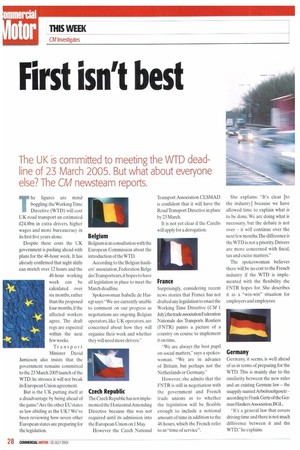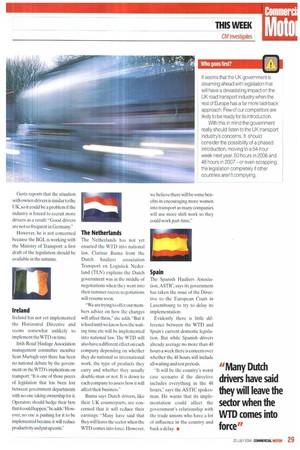First isn't best
Page 28

Page 29

If you've noticed an error in this article please click here to report it so we can fix it.
The UK is committed to meeting the WM dead line of 23 March 2005. But what about everyone else? The CM newsteam reports.
The figures are mind boggling: theWorkingTime Directive (WTD) will cost UK road transport an estimated £24.8bn in extra drivers, higher wages and more bureaucracy in its first five years alone.
Despite these costs the UK government is pushing ahead with plans for the 48-hour week. It has already confirmed that night shifts can stretch over 12 hours and the 48-hour working week can be calculated over six months, rather than the proposed four months, if the affected workers agree. The draft regs are expected within the next few weeks.
Transport Minister David Jamieson also insists that the government remains committed to the 23 March 2005 launch of the WTD: he stresses it will not break its European Union agreement.
But is the UK putting itself at a disadvantage by being ahead of the game? Are the other EU states as law abiding as the UK? We've been reviewing how seven other European states are preparing for the legislation.
Belgium
Belgium is in consultation with the European Commission about the introduction of the WTD.
According to the Belgian hauliers' association, Federation Beige des Transporteurs, it hopes to have all legislation in place to meet the March deadline.
Spokeswoman Isabelle de Haregt says: "We are currently unable to comment on our progress as negotiations are ongoing. Belgian operators, like UK operators, are concerned about how they will organise their work and whether they will need more drivers."
Czech Republic
The Czech Republic has not implemented the Horizontal Amending Directive because this was not required until its admission into the European Union on I May, However the Czech National Transport Association CESMAD is confident that it will have the Road Transport Directive in place by 23 March.
It is not yet clear if the Czechs will apply for a derogation.
France
Surprisingly, considering recent news stories that France has not drafted any legislation to enact the Working Time Directive (CM 1 July), the trade association Federation Nationale des Transports Routiers (FNTR) paints a picture of a country on course to implement it on time.
"We are always the best pupil on social matters," says a spokeswoman. -We are in advance of Britain, but perhaps not the Netherlands or Germany."
However, she admits that the FNTR is still in negotiation with the government and French trade unions as to whether the legislation will be flexible enough to include a notional amount of time in addition to the 48 hours, which the French refer to as "time of service". She explains: "It's clear [to the industry] because we have allowed time to explain what is to be done. We are doing what is necessary, but the debate is not over — it will continue over the next few months.The difference is the WTD is not a priority. Drivers are more concerned with fiscal, tax and excise matters."
The spokeswoman believes there will be no cost to the French industry if the WTD is implemented with the flexibility the FNTR hopes for. She describes it as a "win-win" situation for employers and employees.
Germany
Germany, it seems, is well ahead of us in terms of preparing for the WTD. This is mainly due to the similarity between the new rules and an existing German law — the snappily named Arbeitszeitgesetz — according to Frank Gertz of the German HauliersAssociation,BGL.
"It's a general law that covers driving time and there is not much difference between it and the WTD," he explains. Gertz reports that the situation with owner-drivers is similar to the UK, so it could be a problem if the industry is forced to recruit more drivers as a result: "Good drivers are not so frequent in Germany."
However, he is not concerned because the BGL is working with the Ministry of Transport; a first draft of the legislation should be available in the autumn.
Ireland
Ireland has not yet implemented the Horizontal Directive and seems somewhat unlikely to implement the WTD on time.
Irish Road Haulage Association management committee member Sean Murtagh says there has been no national debate by the government on the WTD's implications on transport: "It is one of those pieces of legislation that has been lost between government departments with no-one taking ownership for it. Operators should hedge their bets that it could happen," he adds.-However, no one is pushing for it to be implemented because it will reduce productivity and put up costs."
The Netherlands
The Netherlands has not yet enacted the WTD into national law. Clarisse I3uma from the Dutch hauliers association Transport en Logistiek Nederland (TLN) explains the Dutch government was in the middle of negotiations when they went into their summer recess: negotiations will resume soon.
"We are trying to offer our members advice on how the changes will affect them." she adds. "But it is hard until we know how the waiting time etc will be implemented into national law. The WTD will also have a different effect on each company depending on whether they do national or international work, the type of products they carry and whether they usually double-man or not. It is down to each company to assess how it will affect their business."
Buma says Dutch drivers, like their UK counterparts, are concerned that it will reduce their earnings: "Many have said that they will leave the sector when the WTD comes into force. However, we believe there will be some benefits in encouraging more women into transport as many companies will use more shift work so they could work part-time."
Spain
The Spanish Hauliers Association, ASTIC, says its government has taken the issue of the Directive to the European Court in Luxembourg to try to delay its implementation.
Evidently there is little difference between the WTD and Spain's current domestic legislation. But while Spanish drivers already average no more than 40 hours a week there is concern over whether the 48 hours will include all waiting and rest periods.
"It will be the country's worst case scenario if the directive includes everything in the 48 hours," says the ASTIC spokesman. He warns that its implementation could affect the government's relationship with the trade unions who have a lot of influence in the country and back a delay. •






























































































































































































